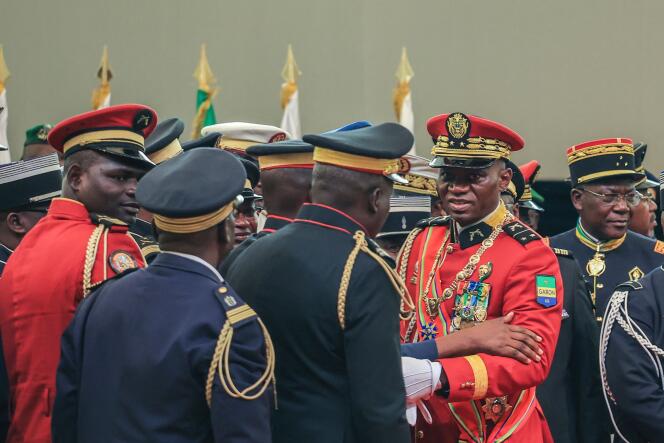


In Gabon, the transition's institutional architecture has been gradually taking shape since the August 30 coup that deposed President Ali Bongo Ondimba (2009-2023), just minutes after the ostensibly rigged presidential election results were announced.
Brigade General Brice Oligui Nguema, the country's new strongman, has demonstrated a real sense of political balance: He has reached out to some of the former regime's fallen figures, is breathing new life into a stifled civil society and has reinvigorated an opposition that had previously been forced to either make concessions or accept predetermined defeats by a regime that had maintained its grip on power and privileges since 1967. But this subtle game does not conceal the omnipotence of the republican guard's former commander-in-chief, who has now become the grand master of the transition's timeframe.
The preamble to the transition charter published on September 4 in the official bulletin of the Gabonese Republic is clear and straightforward: "We, members of the Gabonese Republic's defense and security forces, grouped in the Committee for the Transition and Restoration of Institutions [CTRI], inspired by the desire (...) for change for the sovereign people of Gabon's well-being and togetherness that led to the effective seizure of power by the Gabonese army (...) approve and adopt the present charter."
This text, which General Nguema unveiled on the day of his inauguration, takes precedence over the March 26, 1991 Constitution. Under the signature of the president of the CTRI are those of six generals: Serge Hervé Ngoma, the chief of the national police; Jean Martin Ossima Ndong, the chief of staff of the armed forces; Yves Barrassouaga, the chief of the gendarmerie; Jean Germain Effayong Onong, the chief of prison security; Jean Raymond N'zenze, the chief of the military health service; and lastly, Gabin Oyougou, the director general of military engineering. No civilians were invited to participate.
Primus inter pares, Oligui Nguema has been granted almost all powers. As President of the transition, "he carries out the duties of Head of State, Minister of Defence and Security." He appoints and, if necessary, dismisses the president of the transitional senate and the four vice presidents. He chooses the 50 senators and the National Assembly's 70 lawmakers while also appointing the transitional constitutional court's nine members.
It should be noted that neither the prime minister nor the members of the government or the presidents of the transitional institutions are "eligible for the presidential election, which will be organized to mark the end of the transition." However, this restrictive provision does not apply to the all-powerful head of the transition, therefore avoiding impairing his own political future.
Admittedly, the president of the transition did open up the political game to representatives of the former opposition platform Alternance 2023, which presented a single candidacy against Bongo Ondimba in the August 26 presidential election. It won the prime ministry and the presidency of the Senate for the most senior positions. As far as civil society is concerned, among other personalities, the human rights activist Marc Ona Essangui has been promoted to third vice-president of the Senate. Some prominent members of the former ruling party, the Gabonese Democratic Party (PDG), were also not left out. Among them is Jean-François Ndongou, former Minister of the Interior and new president of the National Assembly.
While public opinion celebrated this overture to the PDG, it had a harder time understanding the leniency granted to former Bongo clan officials released from prison or judicial supervision by the new prince. At the top of the list was Bongo's former chief of staff, Brice Laccruche Alihanga, known as "BLA," all-powerful until his ouster in 2019. Sentenced on October 29, 2021, to five years' imprisonment for forgery and accused since 2022 of embezzlement of public funds, he was released on Monday from Libreville's central prison.
The same reservations were expressed regarding the pardon granted to Renaud Allogho Akoué, one of "BLA's" close friends who was also detained at Gros-Bouquet. This former National Health Insurance and Social Security Fund director was arrested in 2019 as part of "Operation Scorpion," launched to fight corruption while eliminating a few enemies in the process. In 2022, the special criminal court sentenced him to eight years in prison for "embezzlement of public property," "suspected money laundering," "influence peddling" and "attempted corruption." The release of Léandre Nzué, the former mayor of Libreville and another close friend of "BLA," elicited the same reaction.
Such largesse is part of the exceptional regime in force in Gabon. Yet the head of the transition refuses to be called a coup perpetrator. On Wednesday, during one of the many consultations he held with all sectors of Gabonese society, he repeated his credo and invoked the support of the heavens: "Let people take a good look at what has happened around the world, at the coups d'état that have taken place. Ours is not a coup d'état. It is a freedom coup. We had to free the Gabonese people. We led an action in which there was no bloodshed, in which God was with us. He spared us from all this ruckus." For now, at least.
Translation of an original article published in French on lemonde.fr; the publisher may only be liable for the French version.
